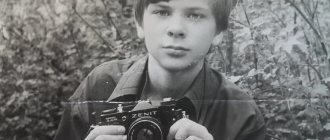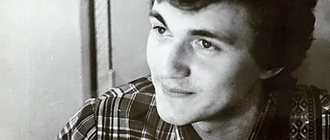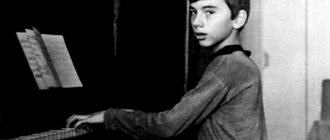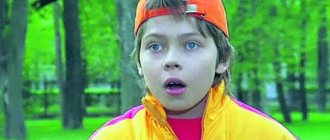Biography of Dmitry Puchkov
Dmitry Yurievich Puchkov (known under the pseudonym Goblin) is a writer, publicist, translator of foreign films, TV series and cartoons. In the past, he tried many working professions, was a policeman, a senior detective in a penitentiary institution.
Starting with commentaries on video games, he created, in addition to traditional translations, humorous versions of famous blockbusters (in particular, “The Fellowship and the Ring”, “The Two Torn Towers”, “The Return of the Homeless” - interpretations of “The Lord of the Rings”).
On the author’s website “Goblin’s Dead End” he offers subscribers discussions of movies, interesting computer devices, and analysis of political events.
Childhood and youth of Dmitry Puchkov
A parody translator was born in the Ukrainian SSR in the city of Kirovograd on August 2, 1961 in the family of a military man and a teacher. His father is a “Russian German”, his mother is Ukrainian. Dmitry has an older brother and sister. She taught him to read and write before school.
In 1969, when he was in 2nd grade, his father was transferred to Leningrad for military service. They lived in Kupchino. Until the 5th grade, Dima was an excellent student, attending school No. 32. From fifth to eighth grade he studied at a boarding school.
Exact sciences were always difficult for him, but he loved literature and reading fairy tales. Puchkov began to learn English because of his passion for such bands as Deep Purple, Led Zeppelin, Black Sabbath. To buy records, the young businessman printed and sold photographs of foreign musicians.
After the 8th grade, in the summer he worked in the Komsomol metalworking brigade. With the money he earned (80 rubles) he bought a bicycle. In those years, Dmitry dreamed of becoming a diver.
He graduated from school near Berlin, in Wünsdorf, where they moved to his military father’s next duty station. Dmitry's attempt to enter college before the army ended in failure; his low knowledge of mathematics let him down.
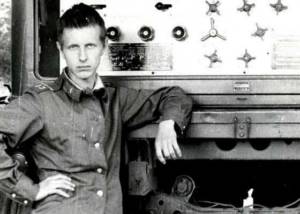
The young man received a driver's license at the DOSAAF driving school and went to work as a driver. At first he transported milk to a GAZ-51, then he was transferred to a bakery.
[edit] Criticism
The use of obscene words caused controversy among Russian viewers. Some viewers especially reject the use of obscene slang in translations. Russian swearing is not just slang, as is commonly believed. It’s like a whole “slang” language consisting only of obscene words. Because of this, some Russian-speaking viewers believe that profanity in Russian is much stronger and more vulgar compared to certain obscene words used in other languages.
Puchkov argues that people who consider the use of obscenities inappropriate do not understand the differences between the development of the Western and Soviet/post-Soviet film industries. During the Soviet Union, the use of obscene words was strictly prohibited, while in the Western world, the appearance of vulgar and rude words in books and films gradually became more accepted by society as freedom of speech. For this reason, Puchkov called himself a “pioneer” in his FAQ.
Dmitry Buzadzhi, a Russian translator, does claim that the quality of Puchkov's own translations is rather mediocre, despite his supposedly careful approach.[7] In particular, he sometimes misses some of the subtle nuances of the work's style. However, his translations attract audiences with their strong individual style and expression (even if they are poorly placed).
Labor activity of Dmitry Puchkov
Dmitry served as a driver in the army. After being demobilized in 1982, he repaired cars and was a dump truck driver. Then, together with his wife and little son, he moved to the south of the country, to Uzbekistan, due to the child’s poor health.
At his new place of residence, he worked as a taxi driver, library employee, blacksmith, plumber, and driller. And, judging by the full number of professions, Puchkov changed his place of work almost every year.
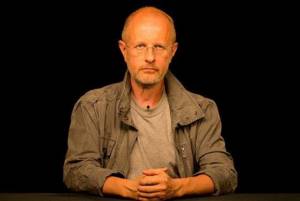
In 1992, he returned to the Northern capital and joined the civil service in the police. After studying at a police school, he held a position in a prison unit. There he received his nickname, which became a literary pseudonym - Goblin. The word was borrowed from a newspaper article “Goblins in Gray Overcoats” about careless law enforcement officers.
In 1998, he retired from service with the rank of first lieutenant. By this time his wife had her own store. And Dmitry, according to him, considered it unethical to combine his occupation with his wife’s commercial activities.
Translations from Dmitry Puchkov
Puchkov began working in the literary field in 1997, publishing articles about video games on one of the Internet sites. Then specialized magazines began publishing his opuses - “Navigator of the Gaming World”, “Land of Games”.
In 1998, the web forum “Goblin’s Dead End” was opened, and a year later the author’s website of the same name was launched. The resource is still quite popular - the number of daily visitors reaches about 70 thousand people. Dmitry translated such games as “Gorky-18”, “Serious Sam: The Second Coming”, “Hooligans”.
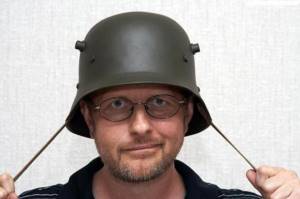
At the same time, he unofficially translated foreign films, the number of which reached 80. Goblin released on DVD the films “Reservoir Dogs”, “Khan to Everyone!”, “Adrenaline-2”, “Like a Cool Security Guard” and others. Working with the TV3 channel, he translated the television series “The Soprano Family”, for REN TV - the animated series “Robot Chicken”, “King of the Hill”, for the 2x2 channel - “Tom Goes to the Mayor”.
His parody translations (“Shmatrix”, “Star Wars: A Storm in a Teacup”) brought great popularity to the film translator. In them, he ridiculed the incorrect approach to translation, which can distort and bring the meaning of the text to the point of absurdity.
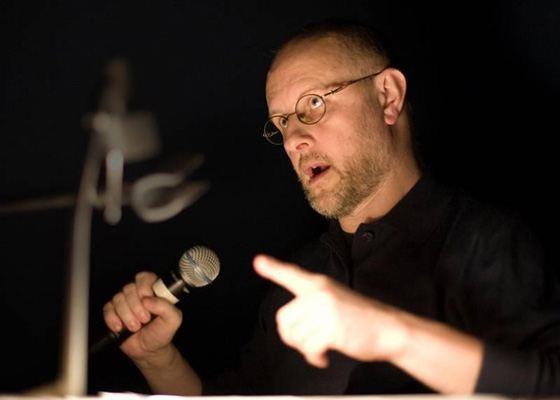
At the request of the STV channel, he also made a similar translation of the film “Boomer” called “Anti-Boomer”.
In 2005, the translator participated in the dubbing of the film “The Last Weekend”, the game “Vivisector”, and began filming the film “Zombies in a Bloody Frenzy”. In 2006, he released the game “Dungeon Orderlies,” which was recognized as the best Russian work and was awarded a number of prizes (Gameland, KRI). In 2006, he voiced “Hottabych” and “translated” Stubbs the Zombie.
In 2008, he released the video game “The Truth about the 9th Company” and a film telling about the actual circumstances of the battle, unreliably recreated in “9th Company” by Fyodor Bondarchuk. He also presented to readers his literary work “It’s a shame for the state. Questions and answers about the USSR,” translated the painting “Rock and Roll Man.”
Widely known
The God's Spark studio, created by Dmitry Yurievich Puchkov, has gained great popularity. Children and adults love translations of science fiction films “Eragon” and “The Lord of the Rings”. Many people liked the parody translations of films of other genres created within Puchkov’s studio.
In 2005, Dmitry took part in the voice acting of “The Last Weekend”, the video game “Vivisector”, etc. In 2006, he released the game “Dungeon Orderlies”, which was recognized as the best work and awarded an industrial prize at a meeting of video game developers. It also became the best role-playing RPG of 2006. Its sequel was released in 2008.
In 2008, Dmitry Puchkov released the game “The Truth about the 9th Company.” It reflected real events, unlike Bondarchuk’s film, where much is unreliable. There were many other works. Dmitry Puchkov emphasizes that the game is not a related product to the famous film, but a separately created creation.
In 2008, Dmitry released a new project “Blue Phil”. In the first 24 hours, the video on YouTube was viewed by over seventeen thousand people. It was downloaded via torrent and mobile applications.
Translators evaluate Puchkov’s work differently. Many people like it. They note talent, sense of humor and a very high level of professionalism in the parody genre. Another part of his colleagues accuses Dmitry of not graduating from a special school for translators, and his audience of listeners is quite small and undemanding.
Personal life of Dmitry Puchkov
When asked by one of the journalists what family means to him, the writer replied: “Practically, the meaning of life.” Puchkov acquired it early, in April 1980 at the age of 18. Moreover, he never regretted the choice of his life partner, who is three years older than him.
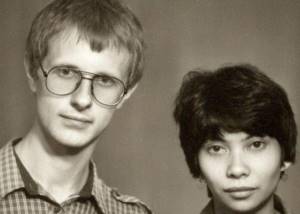
Dmitry did not mention the name of his beloved wife, who is half Jewish and half Korean, in any of the interviews. Not much is known about her occupation either - only that she is engaged in commerce.
The wife is critical of films created by her husband, but the son does not ignore his father’s creations, he watches them. True, he did not continue his business, but works as the general director of a construction organization. The young man did not serve in the army due to vision problems.
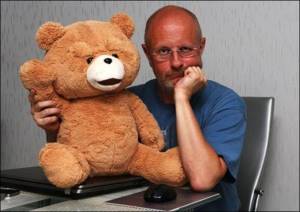
Dmitry has visited many places - Scandinavia, Iceland, Paris, Saigon, New York, Las Vegas, San Francisco, the Maldives and Canary Islands. He usually takes a vacation twice a year, once devoting it to relaxing on the beach and doing nothing, the second to exploring interesting places. In the first case, Dmitry often travels to Vietnam, Thailand or Cambodia, in the second - to Europe, with a backpack and a camera.
Dmitry loves photography, filmmaking, reading, and writing scripts. He has a very good memory - he can supposedly remember and pronounce about a hundred words, and then repeat them in reverse order.

Among his talents, the writer noted the ability to move his ears, sing and knowledge of astronomy. As a teenager, he built telescopes himself and observed celestial bodies, and now he added a new telescope to his set of technical devices (iPhone, MacBook, Mac Pro, iPad, iPod), video cameras and cameras in 2014.
Puchkov is an atheist. Has no higher education.
Dmitry Puchkov today
In 2009, the publication Sobaka.ru included the writer in the TOP 50 most famous people in St. Petersburg. In 2012, Dmitry joined the Public Council under the Ministry of Culture of the Russian Federation.
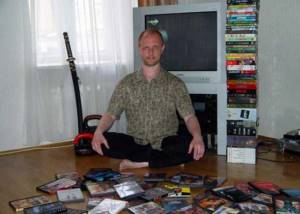
In 2014, a book was published in the city on the Neva, combining comments from Puchkov’s author’s website, “Ukraine is Russia.”
While visiting the Komsomolskaya Pravda radio in September 2015, the film translator expressed his opinion on the need for forced drug testing of schoolchildren without parental permission, following the example of the United States. He considers it expedient to oblige law enforcement officers, military personnel, public transport drivers, and aircraft pilots to undergo this procedure as well.
The work of a writer and translator who does not have a philological education is assessed ambiguously by critics and professionals. Recognizing his abilities and presence of a sense of humor, experts accuse Dmitry of excessive self-confidence and targeting an indiscriminate and undemanding public.
[edit] Sources
- About the developers of “Dungeon Orderlies” (Russian). [ inaccessible link
] Retrieved January 14, 2021. - Art. o/u Goblin (Russian).[ inaccessible link
]Retrieved January 14, 2021. - Goblin LLC // RBC // RBC Companies
- Schreck, Carl
.
Goblin Makes Case Against Demonizing Expletives, The St.
Petersburg Times (July 29, 2003). Retrieved March 16, 2007. - Liakhovich, Oleg
.
Elves and Goblins of Russian Translation, The Moscow News
(October 2005). Retrieved March 16, 2007. - Puchkov, Dmitry
Questions to Goblin about film translations (Russian).
oper.ru
(July 29, 2012). - Buzadzhi, Dmitry
Hero of the fishlessness (Russian).
KpNemo
(March 13, 2006).


